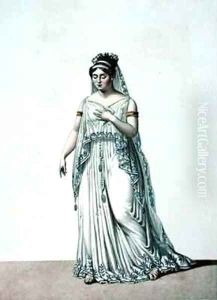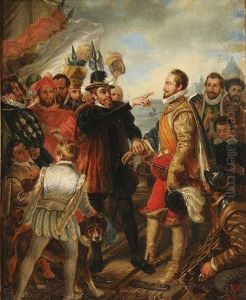Antoine Pierre Charles Favart Paintings
Antoine Pierre Charles Favart, born in 1706 and deceased in 1792, was a prominent figure in the 18th-century French theatrical world, although he is not as widely known today as some of his contemporaries. His life and career were deeply intertwined with the rich cultural milieu of Enlightenment France, a period marked by significant intellectual, artistic, and social ferment. Favart's contributions, particularly to the realm of French opera and theatre, reflect the era's tastes and its gradual shift towards more accessible and bourgeois forms of entertainment.
Favart's early life is somewhat obscured by the lack of comprehensive records, but it is known that he was deeply enamored with the theatre from a young age. This passion would lead him to become an influential playwright, director, and manager, leaving a lasting impact on the French theatrical tradition. His work was characterized by a keen sense of wit and a flair for incorporating elements of the comique and the poignant, often blending opera and spoken drama to create engaging and dynamic performances that appealed to the diverse audiences of his time.
Throughout his career, Antoine Favart held various positions of influence, including leadership roles at several prominent theaters in Paris. His innovative approaches to production and his ability to adapt foreign works for French audiences were particularly noteworthy. Favart's adaptability and creative vision helped to popularize opéra comique, a genre that became a staple of French musical theatre, combining elements of opera with spoken dialogue to tell more relatable and comedic stories. This genre was a precursor to modern musical theatre and has had a lasting influence on the development of Western theatrical traditions.
Despite facing challenges, including censorship and the shifting political landscape of pre-revolutionary France, Favart's legacy as a creative force in the theatre endured. His works continued to be performed after his death, and his influence can be seen in the evolution of French theatre and opera. Favart's life and career offer a fascinating glimpse into the complexities of 18th-century French cultural life and the enduring power of the arts to reflect and shape societal values.

